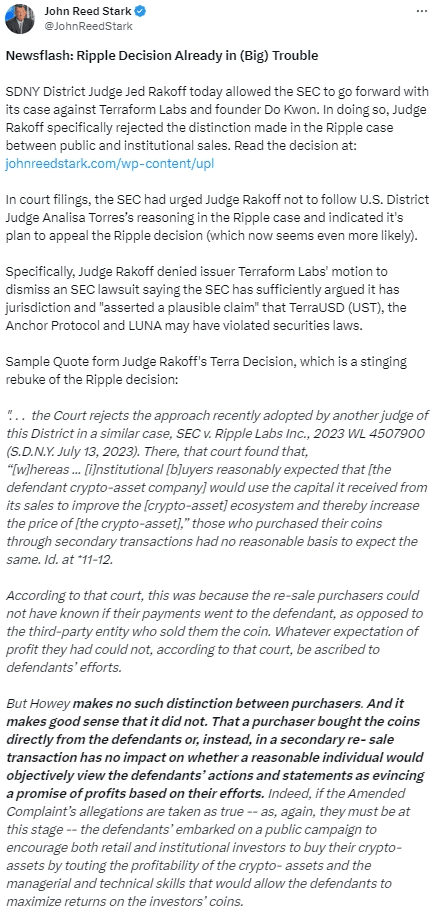On Tuesday (August 1) breakfast, Bitcoin fell below $29,000 in the short term, and bearish sentiment quickly gathered. A New York judge made a clear statement, dismissing another judge's previous ruling that "Ripple is not a security", and Ripple's lawsuit for violating securities laws is once again in big trouble. Coinbase CEO Brian Armstrong disclosed at the beginning of the week that he had received an order from the US Securities and Exchange Commission to stop all cryptocurrency transactions other than Bitcoin.

“Ripple is not a security” is in big trouble again
The SEC's lawsuit against Terraform Labs continues, and Judge Jed Rakoff of the Southern District Court of New York on Monday rejected the company's motion to dismiss the SEC's appeal. In issuing the order, the judge also rejected the ruling of another judge, which ruled that the sales method of Ripple did not violate securities laws. It should be noted that this will have a far-reaching impact on the crypto market. Once Ripple returns to the definition of "non-securities", it is likely that Ethereum and other altcoins will face the risk of being classified as "securities."
In the Terraform Labs case, Judge Jed cited recently leaked emails from former SEC Director William Hinman, whose contents were used in the Ripple lawsuit. The judge interpreted: "Putting the cryptocurrency industry on the same level of importance as the U.S. energy and tobacco industries ignores reality."
Jed spent several pages analyzing the Howey Test, which is at the heart of Hinman’s discussion. Jed wrote that no formal contract is required to satisfy the test, and that the tokens themselves can be considered tokens in court arguments. The court also declined to “distinguish between tokens based on how they were sold.”


In court papers, the SEC urged Jade not to follow the reasoning of U.S. District Judge Analisa Torres in the Ripple case. The regulator said it was considering appealing Ripple's decision, which ruled that XRP, the cryptocurrency launched by Ripple, was a security when it was sold directly to institutional investors, rather than to the general public on an exchange.
“The court declined to distinguish the tokens based on how they were sold, such that those sold directly to institutional investors were considered securities, while those sold to retail investors through secondary market transactions were not,” Jade said in Terraform’s ruling.
“The New York court rejected an approach recently taken by another judge in the region in a similar case.”
SEC: Requires Coinbase to remove all cryptocurrencies except Bitcoin
Armstrong disclosed to the British media that the SEC had ordered the exchange to stop trading in all cryptocurrencies except Bitcoin in June, and the case has now entered legal proceedings. The SEC argues that all cryptocurrencies except Bitcoin are securities. Armstrong said: "The SEC came back to us and said, we believe that all assets except Bitcoin are securities."
The SEC's lawsuit against Coinbase identified 13 cryptocurrencies with smaller trading volumes on the platform as securities, claiming that by offering them to customers, the exchange fell within the regulator's purview. But Coinbase was previously required to delist every one of the more than 200 cryptocurrencies it offers, except Bitcoin.
This suggests that the SEC, under the leadership of Chairman Gary Gensler, has pushed for broader authority over the crypto industry.
The SEC's crackdown on cryptocurrencies has not weakened at all. Whether in the lawsuits against Ripple and Terraform Labs or in ordering Coinbase to remove cryptocurrencies, it shows that the regulator hopes to include cryptocurrencies in the management of securities laws to avoid transferring power to the Commodity Futures Trading Commission (CFTC). This means that a new round of negative factors has appeared in the crypto market again.
On Monday, the SEC sued Richard Schueler, also known as Richard Heart, for allegedly selling unregistered securities. Heart is the founder of the Pulsechain, PulseX, and Hex projects, both of which have been mired in controversy during their existence.
According to the SEC, Heart raised more than $1 billion by selling tokens for these projects and had previously made comments suggesting that Hex’s value would increase. The regulator claims that Heart defrauded investors by misappropriating at least $12 million of customer funds for personal purchases of luxury goods rather than developing the protocol.
